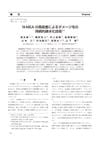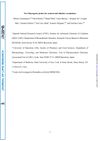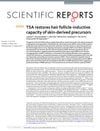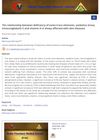3 citations,
January 2002 in “Springer eBooks” Alkaline hair relaxers damage hair, but cationic and non-ionic polymers can help reduce this damage.
 47 citations,
January 2017 in “RSC Advances”
47 citations,
January 2017 in “RSC Advances” Keratin peptides can change hair shape gently without harsh chemicals.
 January 2011 in “Journal of Society of Cosmetic Chemists of Japan”
January 2011 in “Journal of Society of Cosmetic Chemists of Japan” 18-MEA and SPDA can restore damaged hair's smoothness and reduce frizz.
 7 citations,
June 2021 in “Cell Proliferation”
7 citations,
June 2021 in “Cell Proliferation” Low oxygen levels improve the function of hair and skin cells when they are in direct contact.
 43 citations,
March 2009 in “Journal of Cellular and Molecular Medicine”
43 citations,
March 2009 in “Journal of Cellular and Molecular Medicine” TGF-β2 plays a key role in human hair growth and development.
 28 citations,
March 2010 in “Histochemistry and cell biology”
28 citations,
March 2010 in “Histochemistry and cell biology” Skin cells can help create early hair-like structures in lab cultures.
 November 2024 in “International Journal of Cosmetic Science”
November 2024 in “International Journal of Cosmetic Science” Haircare products with a pH between 5 and 7 are best for maintaining healthy hair.
December 2020 in “The Medical journal of Basrah University” Low vitamin D levels may contribute to female pattern hair loss.
 5 citations,
March 2019 in “Journal of lipid research”
5 citations,
March 2019 in “Journal of lipid research” New probes were created to effectively measure specific enzymes involved in fat metabolism, which could help develop new drugs.
 4 citations,
March 2021 in “Parasitology Research”
4 citations,
March 2021 in “Parasitology Research” Besnoitiosis, a parasitic disease, has been found in donkeys in Italy and may be more common in Europe than previously thought.
 18 citations,
February 2019 in “Scientific Reports”
18 citations,
February 2019 in “Scientific Reports” Trichostatin A helps restore hair-growing ability in skin cells used for hair regeneration.
7 citations,
January 2001 in “Comprehensive series in photosciences” UV radiation significantly damages hair, especially with humidity, making it more vulnerable to further damage.
 9 citations,
August 2000 in “Journal of Periodontal Research”
9 citations,
August 2000 in “Journal of Periodontal Research” Finasteride reduces testosterone conversion, progesterone lessens this, and levamisole enhances finasteride's effect.
 April 2023 in “Journal of Investigative Dermatology”
April 2023 in “Journal of Investigative Dermatology” Ganoderma lucidum extract can potentially reduce stress-induced hair loss by slowing down premature hair aging and removing harmful substances.
 208 citations,
December 2003 in “Journal of Investigative Dermatology”
208 citations,
December 2003 in “Journal of Investigative Dermatology” Certain cells from hair follicles can create new hair and contribute to hair growth when implanted in mice.
 9 citations,
February 2022 in “Genes”
9 citations,
February 2022 in “Genes” Women with PCOS have more Bifidobacterium in their gut compared to those without PCOS.
 April 2018 in “Journal of Chromatographic Science”
April 2018 in “Journal of Chromatographic Science” Finasteride's stability and safety confirmed through precise analytical methods.
 September 2020 in “Benha Veterinary Medical Journal”
September 2020 in “Benha Veterinary Medical Journal” Sheep with skin diseases often have lower levels of certain trace elements and vitamin A, and higher oxidative stress and immunoglobulin E levels.

KY19382 helps to regrow hair and create new hair follicles.
 August 2023 in “Journal of Student Research”
August 2023 in “Journal of Student Research” Human hair keratin mixed with rubber slightly improves its strength and biodegradability.
 9 citations,
August 2015 in “Tissue Engineering and Regenerative Medicine”
9 citations,
August 2015 in “Tissue Engineering and Regenerative Medicine” Human skin cell byproducts can potentially be used to treat hair loss and promote hair growth.
 1 citations,
December 2022 in “Middle East Journal of Science”
1 citations,
December 2022 in “Middle East Journal of Science” Permanent hair dyes use chemicals that react with hydrogen peroxide to create color.
 1 citations,
September 2017 in “Journal of Investigative Dermatology”
1 citations,
September 2017 in “Journal of Investigative Dermatology” Blocking a specific enzyme can reduce the negative impact of stress hormones on hair growth cells.
2 citations,
May 2006 in “Journal of Separation Science” The method effectively measures spermidine in hair lotions.
 May 2023 in “Stem cell research & therapy”
May 2023 in “Stem cell research & therapy” New method efficiently isolates hair growth cells from newborn mouse skin.
5 citations,
March 2011 in “Journal of proteomics” Histone H4, released by cells exposed to colchicine, can cause hair loss by inhibiting cell growth and enzyme activity.
 61 citations,
June 2014 in “Scientific Reports”
61 citations,
June 2014 in “Scientific Reports” Wnt1a-conditioned medium from stem cells helps activate cells important for hair growth and can promote hair regrowth.
 5 citations,
January 2017 in “Dermatologic Surgery”
5 citations,
January 2017 in “Dermatologic Surgery” Storing hair follicle micrografts for longer times can cause them to enter a state similar to the natural hair shedding phase, which might impact hair transplant results.
 7 citations,
January 2022 in “Molecules”
7 citations,
January 2022 in “Molecules” Tectoridin helps human hair cells grow and makes mouse hair longer, suggesting it could treat hair loss.
2 citations,
December 2009 Herbal extracts can help hair regrowth and may treat hair loss.























